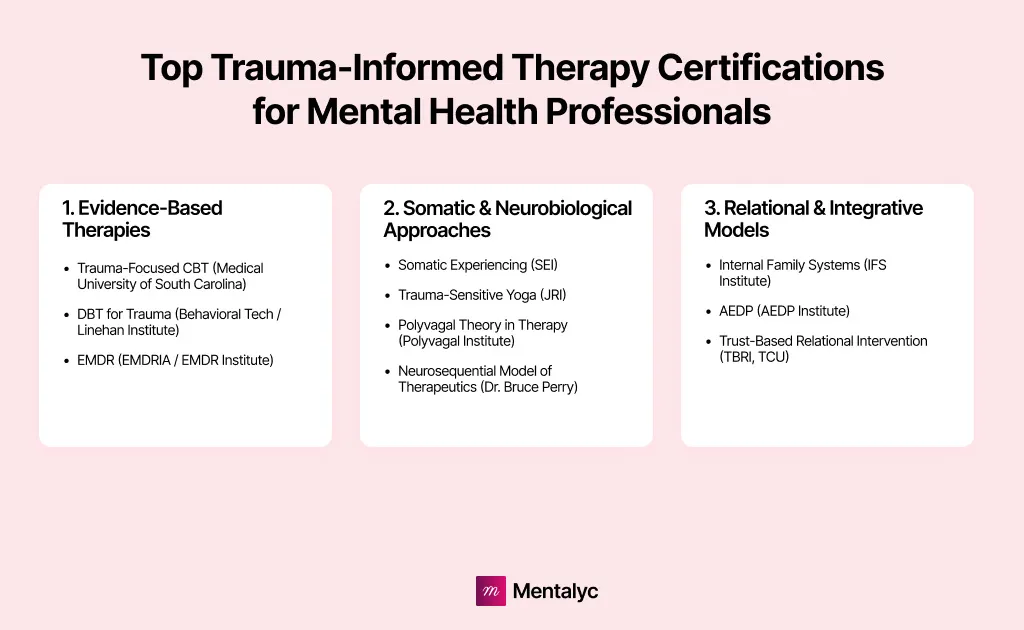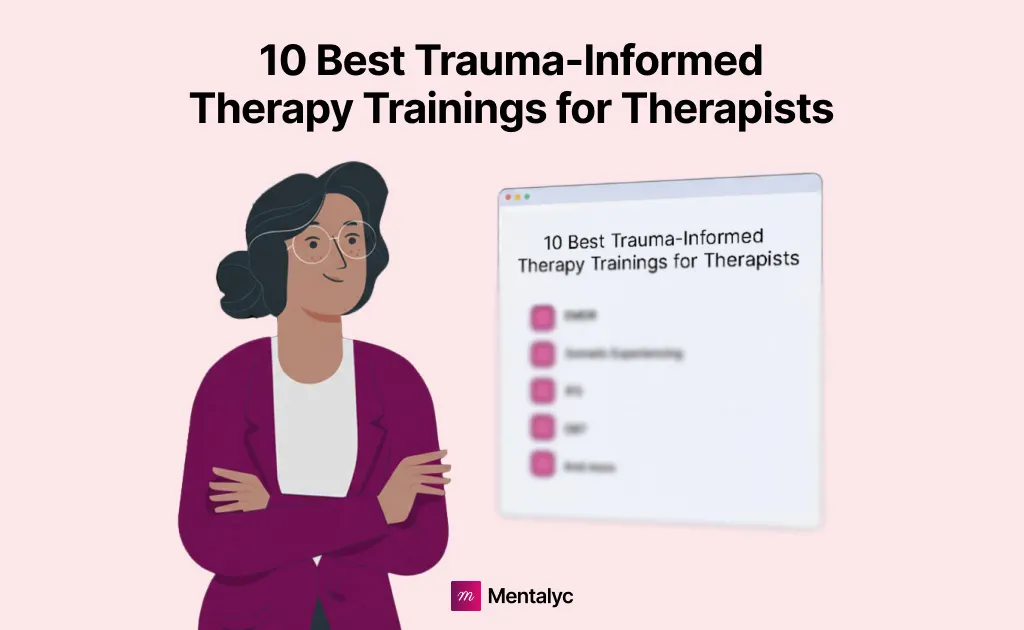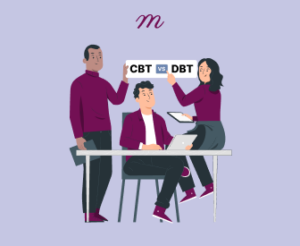For clinicians, pursuing the right trauma training isn’t just professional development. Trauma-informed therapy is essential to deepening empathy, refining technique, and understanding how trauma shapes both body and mind.
In this guide, you’ll find ten of the best trauma-informed therapy trainings for therapists to expand your skills and confidence in trauma work.
And when it comes to applying what you’ve learned in real sessions, Mentalyc AI Note Taker helps you capture and reflect on trauma-related insights effortlessly. As a Clinical Intelligence platform, it documents trauma sessions, tracks client progress, and. Through Alliance Genie™, it ****reveals subtle shifts in therapeutic connection, helping you grow with every session.
As your trauma-informed skills grow, the AI Treatment Planner can help you organize complex trauma cases into structured, measurable goals, while the AI Progress Tracker by Mentalyc supports ongoing monitoring of symptom reduction, nervous system regulation, and client resilience over time.
Summary of Trauma-Informed Therapy Trainings for Therapists

| Training Program | Provider/Institution | Duration | Focus Area | Best For |
| Trauma-Focused Cognitive Behavioral Therapy (TF-CBT) | Medical University of South Carolina | 3–6 months | Cognitive-behavioral therapy for children and adolescents | Therapists working with young clients affected by trauma |
| Eye Movement Desensitization and Reprocessing (EMDR) | EMDR Institute / EMDRIA | 4 days (basic) + supervision hours | Bilateral stimulation for trauma processing | Therapists treating PTSD and complex trauma |
| Somatic Experiencing (SE) | Somatic Experiencing International | 12 days – 10 months | Body-based regulation and trauma release | Therapists focusing on mind-body connection |
| The Neurosequential Model of Therapeutics (NMT) | The Neurosequential Network (Dr. Bruce Perry) | 1 day – 6 months | Neuroscience-based trauma intervention models | Clinicians treating developmental and attachment trauma |
| Internal Family Systems (IFS) | IFS Institute | 5 days – 3+ months | Parts work and internal healing | Therapists addressing dissociation or complex trauma |
| Trust-Based Relational Intervention (TBRI) | Karyn Purvis Institute of Child Development | 2 days | Attachment-based caregiving and connection | Therapists and caregivers supporting foster/adoptive families |
| Accelerated Experiential Dynamic Psychotherapy (AEDP) | AEDP Institute | 4–5 days | Relational and experiential trauma healing | Therapists focusing on attachment and emotional repair |
| Trauma-Sensitive Yoga (TSY) Certification | Center for Trauma and Embodiment at JRI | 25 hours | Somatic and movement-based trauma recovery | Therapists using somatic and yoga-based methods |
| Polyvagal Theory in Therapy | Polyvagal Institute (Deb Dana) | 2 days | Nervous system regulation and safety | Therapists applying neuroscience-based trauma-informed counseling |
| Dialectical Behavior Therapy (DBT) for Trauma | Behavioral Tech / Linehan Institute | 6–12 months | Mindfulness, emotional regulation, and coping | Therapists treating emotional dysregulation and personality disorders |
1. Trauma-Focused Cognitive Behavioral Therapy (TF-CBT)
Provider: Medical University of South Carolina. 3-6 months
Overview: TF-CBT is an evidence-based approach designed for children and adolescents who have experienced trauma. It integrates cognitive-behavioral techniques with psychoeducation and caregiver involvement.
Best For: This trauma-informed therapy training is ideal for therapists working with young clients affected by trauma.
Why It’s Important: Childhood trauma has long-term consequences on emotional and cognitive development. TF-CBT offers structured interventions that enable the child to work through their experiences in a safe and supported setting. It involves caregivers, thus enhancing family relationships and an open environment for healing.TF-CBT also enables children to modify negative self-attributions, decrease trauma-related distress, and acquire effective coping skills. The empirically-supported treatment is specifically vital in stopping other mental illness later in life from developing.
Many professionals seek trauma-focused CBT training to develop specialized skills in helping young trauma survivors process distressing experiences safely.
2. Eye Movement Desensitization and Reprocessing (EMDR) Training
Provider: EMDR Institute, EMDRIA, 4 days basic training + additional hours
Overview: EMDR is a structured therapy that helps clients process traumatic memories through bilateral stimulation. It is widely recognized for its effectiveness in treating PTSD and complex trauma.
Best For: This is one of the best trauma-informed therapy courses for therapists working with PTSD, anxiety, and complex trauma.
Why It’s Important: Trauma becomes ‘stuck’ in the memory networks of the brain and causes intrusive thought and distress. EMDR enables the client to reprocess traumatic memories in a manner such that they are less graphic and emotionally evocative. With bilateral stimulation protocols, EMDR engages the brain’s internal healing system so that the individual can reprocess what they have experienced less distressingly and more adaptively. This makes it particularly valuable for clients who cannot verbalize their trauma.
Many professionals pursue EMDR training for therapists to deepen their understanding of how to safely guide clients through trauma processing.
3. Somatic Experiencing (SE) Training
Provider: Somatic Experiencing International, level 1: 12 days, level 2: 10 months
Overview: SE focuses on the body’s response to trauma and aims to release stored stress through bodily awareness and regulation techniques.
Best For: Somatic experiencing training is best for therapists interested in body-based trauma interventions.
Why It’s Important: Trauma is also a psychological as much as it is a physiological process. The body stores trauma in muscle tension, nervous system dysregulation, and stress response. SE provides the clients with the opportunity to access and release this stored energy, which makes for deep healing.This approach is required by clients who have dissociation, hypervigilance, or trauma-related chronic pain. By teaching self-regulation skills, SE enables clients to become safe in their bodies.
4. The Neurosequential Model of Therapeutics (NMT)
Provider: Dr. Bruce Perry / The Neurosequential Network, 1 day – 6 months per levels
Overview: NMT applies neuroscience principles to trauma treatment, emphasizing brain development and sequencing interventions accordingly.
Best For: This is one of the best trauma therapist training programs for clinicians working with developmental trauma and attachment disorders.
Why It’s Important: Early trauma affects the development of the brain, and it causes emotional and behavior difficulties. NMT allows therapists to identify what parts of the brain have been impacted and build interventions based on that. By understanding the neurobiology of trauma, practitioners can design more effective treatment with better emotional control and cognitive abilities and have improved long-term results.
5. Internal Family Systems (IFS) Training
Provider: IFS Institute, level 1 – 5 days, up to 3+ months per level
Overview: IFS helps clients explore and heal different ‘parts’ of themselves, especially those affected by trauma, through self-compassion and integration.
Best For: This trauma-focused therapy training program is ideal for therapists addressing trauma-related dissociation and inner conflicts.
Why It’s Important: Internal fragmentation exists in most survivors of trauma, where parts of them have incompatible feelings or memories. In IFS, clients learn to name and integrate such parts with shame or repression. IFS works particularly well with people who have dissociative disorders or complex trauma, as it enables them to treat fragmented aspects of themselves in an explicit and orderly way. IFS makes the client heal by the inner process and compassion towards themselves through the facilitation of inner dialogue and enhancing resilience and emotional steadiness.
6. Trust-Based Relational Intervention (TBRI)
Provider: Karyn Purvis Institute of Child Development, 2 day certification course
Overview: TBRI is designed to help caregivers and therapists support children from hard places, emphasizing connection, empowerment, and correction.
Best For: This trauma-informed care training is best for those working with foster and adoptive families.
Why It’s Important: The majority of children from the adoption or foster system have a history of neglect, abuse, or early attachment trauma. TBRI offers a method of regaining safety and trust in the relationship. By offering caregivers methods of creating a safe haven, TBRI enhances the competency of children in forming healthy attachment. This thereby reduces behavior issues and improves emotional well-being in the long term.
7. Accelerated Experiential Dynamic Psychotherapy (AEDP)
Provider: AEDP Institute, 4-5 days
Overview: AEDP fosters deep emotional healing by helping clients process trauma through a relational and experiential lens.
Best For: Therapists focusing on emotional healing and attachment repair.
Why It’s Important: AEDP places the therapeutic power of relationships in the center, since trauma is often the result of relational hurt. AEDP allows clients to strive to become securely attached and to have corrective emotional experiences. The experiential nature of AEDP allows clients to metabolize feelings in the moment, and therefore is a rich method for transforming trauma into resilience and self-change.
8. Trauma-Sensitive Yoga (TSY) Certification
Provider: Center for Trauma and Embodiment at JRI, 25 hours
Overview: TSY incorporates yoga-based practices to help trauma survivors reconnect with their bodies in a safe and empowering way.
Best For: This trauma-sensitive yoga certification is ideal for therapists integrating somatic approaches into trauma care.
Why It’s Important: Trauma survivors feel a sense of disconnection from their body. TSY is a gentle way of re-attunement with the body and sense of control, and this reduces symptoms of dissociation and hypervigilance.Through mindful movement and breathing, TSY assists the nervous system to modulate stress and trauma responses and is therefore an effective adjunct to talk therapy.
Many clinicians pursuing trauma therapy certification include TSY as part of their holistic trauma education to better support clients in body awareness and safety.
9. Polyvagal Theory in Therapy
Provider: Deb Dana / Polyvagal Institute, 2 days
Overview: This training applies Dr. Stephen Porges’ polyvagal theory to therapy, helping clients regulate their nervous system responses to trauma.
Best For: This is one of the top trauma-informed therapy trainings for therapists incorporating neuroscience-based trauma treatments.
Why It’s Important: The importance of understanding the role of the autonomic nervous system in trauma lies in treatment. The polyvagal theory describes how traumatized patients can be challenged by safety, connection, and emotional regulation. By utilizing polyvagal-guided interventions, therapists can help their clients calm the nervous system and reduce PTSD and anxiety symptoms so that they can participate more fully in healthful relationships.
10. Dialectical Behavior Therapy (DBT) for Trauma
Provider: Behavioral Tech / Linehan Institute, 6-12 months
Overview: DBT is highly effective for clients with trauma-related emotional dysregulation, using mindfulness, distress tolerance, and emotional regulation strategies.
Best For: Therapists treating clients with complex trauma, self-harm, or personality disorders. It is a well-regarded component of many trauma therapist continuing education pathways that focus on emotion regulation and resilience.
Why It’s Important: Trauma leads to hyperarousal emotional dysregulation, and clients have difficulty coping with distress and relationship maintenance. DBT provides structured techniques to build resilience and coping skills. Mindfulness and acceptance as goals allow clients to weather storms of emotion more effectively, with added psychological stability.
DBT also fosters self-esteem and validation of emotions, critical for survivors of trauma who might have learned shame or inadequacy throughout the course of their trauma. Also, the focus of DBT on distress tolerance helps clients endure emotional suffering without engaging in maladaptive behaviors, which is extremely useful for traumatized clients who may utilize self-injurious coping mechanisms. The therapy is short- and long-term depending on the severity of trauma and depending on the needs of the client, so that therapists can adjust the treatment as per their client’s needs and pace.
Choosing the Right Trauma Training Program
| Consideration | Description | What to Look For |
| Therapeutic Focus | Match the program to your client population and preferred trauma healing modalities. | Programs focusing on trauma intervention models like EMDR or SE if you specialize in somatic or cognitive trauma care. |
| Accreditation and Certification | Ensures the program meets professional standards and offers recognized credentials. | Look for trauma-informed care certification for therapists or other credible trauma certification programs. |
| Learning Format | Consider flexibility, time commitment, and mode of delivery. | Online trauma therapy courses can be ideal for busy clinicians seeking remote learning. |
| Depth and Specialization | Programs vary from introductory to advanced levels. | Choose based on your experience level—introductory for new therapists, advanced for clinical specialists. |
| Integration with Practice | The ability to apply learned techniques in real-world sessions. | Seek courses emphasizing client safety and empowerment and practical clinical application. |
| Instructor Expertise | Quality and background of trainers directly affect the learning experience. | Opt for instructors with experience in psychological trauma, neuroscience, or trauma-informed counseling. |
| Support and Supervision | Programs offering mentorship or supervision aid in skill integration. | Choose programs providing feedback and peer support for long-term professional growth. |
Enhance Your Trauma-Informed Practice with Mentalyc
Trauma-informed care requires more than empathy. It demands reflection, accuracy, and a clear view of client progress over time. Mentalyc supports that process through Clinical Intelligence that transforms session content into meaningful, compliant documentation.
Designed for mental health professionals, Mentalyc helps you capture trauma-related themes, track healing progress, and. Through Alliance Genie™, you can reflect on subtle shifts in therapeutic connection. Every note remains secure, HIPAA and SOC 2 Type II compliant, and aligned with best-practice clinical standards.
Turn your sessions into continuous learning experiences with Mentalyc — where insight meets care, and compliance takes care of itself.
Therapists who want additional trauma-informed resources and training updates can connect with Mentalyc through Facebook and Instagram.
Frequently Asked Questions (FAQ) About Trauma Training for Therapists
1. What Is Trauma-Informed Therapy Training?
Trauma-Informed therapy training teaches therapists how to recognize the widespread impact of trauma and respond with practices that prioritize client safety and empowerment. It emphasizes understanding how psychological trauma affects the brain, body, and behavior, and how to create a therapeutic environment that fosters trust and healing. Through such training, therapists learn to integrate trauma healing modalities, such as somatic work and attachment-focused interventions, into their clinical practice. Many professionals pursue trauma-informed care certification for therapists to strengthen their skills and ensure ethical, compassionate trauma work.
2. How to Choose the Right Trauma Training Program?
When selecting from various trauma certification programs, therapists should consider factors like evidence-based curriculum, instructor credentials, supervision opportunities, and applicability to their client population. Some practitioners prefer online trauma therapy courses for flexibility and access to international faculty, while others choose in-person intensive workshops for experiential learning. It’s also important to ensure that the program integrates neuroscience, nervous system regulation, and the mind-body connection to support effective trauma-informed care.
3. What Is the Best Trauma Training for Therapists?
The best trauma training depends on your area of focus and clinical population. Programs like EMDR, Somatic Experiencing, and Internal Family Systems are among the most reputable trauma intervention models. For therapists working with children or families, TF-CBT and TBRI are excellent options. Those interested in holistic methods might explore polyvagal-based or mindfulness-centered trainings. A good trauma program should blend theory with practice and help clinicians apply trauma-informed counseling strategies that foster both emotional and physiological healing.
4. What Are the Benefits of Trauma-Informed Care for Therapists and Clients?
Trauma-informed care benefits both therapists and clients by creating a collaborative, compassionate therapeutic relationship. For clients, it promotes trauma recovery, emotional regulation, and long-term resilience. For therapists, it enhances clinical confidence, reduces burnout, and provides a structured framework for mental health treatment. By applying trauma-informed approach principles, clinicians can address symptoms of post-traumatic stress disorder (PTSD) more effectively while supporting resilience building and sustainable healing outcomes.
5. Is DBT or CBT Better for Trauma?
Both DBT (Dialectical Behavior Therapy) and CBT (Cognitive Behavioral Therapy) are effective in trauma treatment, but their focus differs. CBT targets distorted thoughts and beliefs stemming from trauma, while DBT emphasizes emotional regulation and distress tolerance. For clients with complex trauma or self-harming behaviors, DBT may be more beneficial. Meanwhile, CBT, especially Trauma-Focused CBT, is highly effective for structured trauma intervention models in children and adolescents. Many therapists combine these approaches for comprehensive trauma care.
6. What Is the Difference Between Trauma Therapy and Trauma-Informed Therapy?
Trauma therapy directly treats the traumatic event and its symptoms—using specific techniques like EMDR, Somatic Experiencing, or exposure therapy. In contrast, trauma-informed therapy is a broader framework applied across all types of therapy. It ensures that treatment environments, interventions, and communication styles are sensitive to the effects of trauma.
7. What Is an Example of a Trauma-Informed Approach?
A trauma-informed approach might include practices like offering clients choices during sessions, maintaining predictable routines, and using grounding techniques for nervous system regulation. For instance, a therapist might invite a client to pause and notice sensations in the body before discussing distressing memories, honoring the mind-body connection. Such approaches foster trust, encourage self-awareness, and enhance long-term trauma recovery through safety, compassion, and empowerment.
Why other mental health professionals love Mentalyc

“If I were recommending this software to a colleague, I would tell them that it is the best thing that they could do for their practice.”
Licensed Professional Counselor

“For anyone hesitant: this is a lifesaver. It will change your life, and you have more time to be present with your patients.”
Licensed Clinical Social Worker

“Do yourself a favor, make your life easier. I found Mentalyc to be one of the best tools that I’ve ever used.”
Licensed Marriage and Family Therapist

“It immediately changed my quality of life, personally and professionally.”
Owner/Independently Licensed Marriage & Family Therapist (LMFT)






